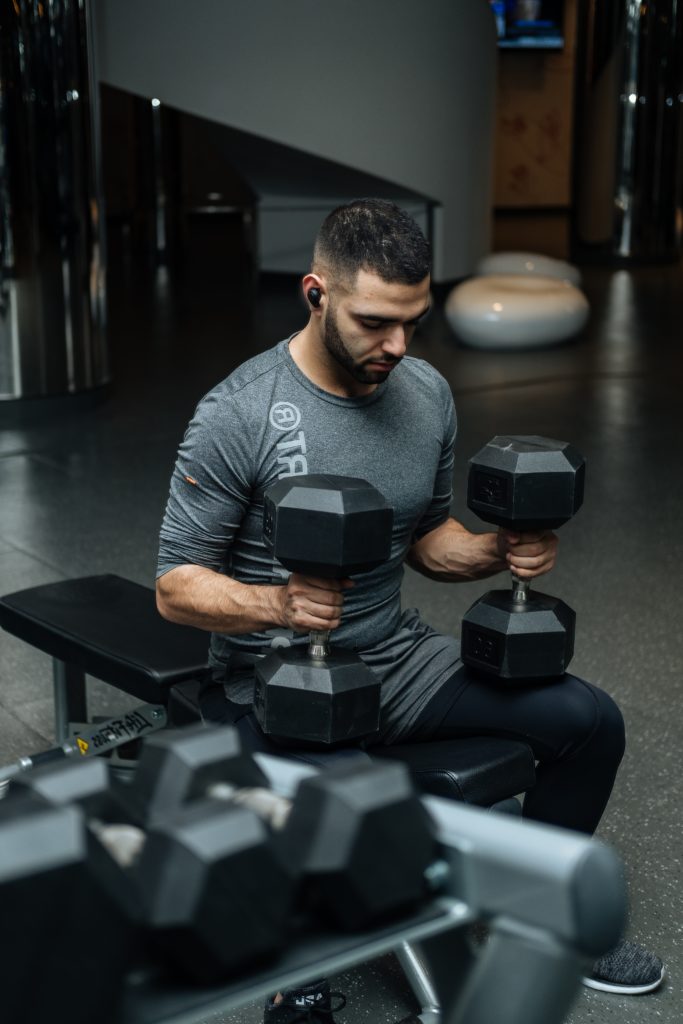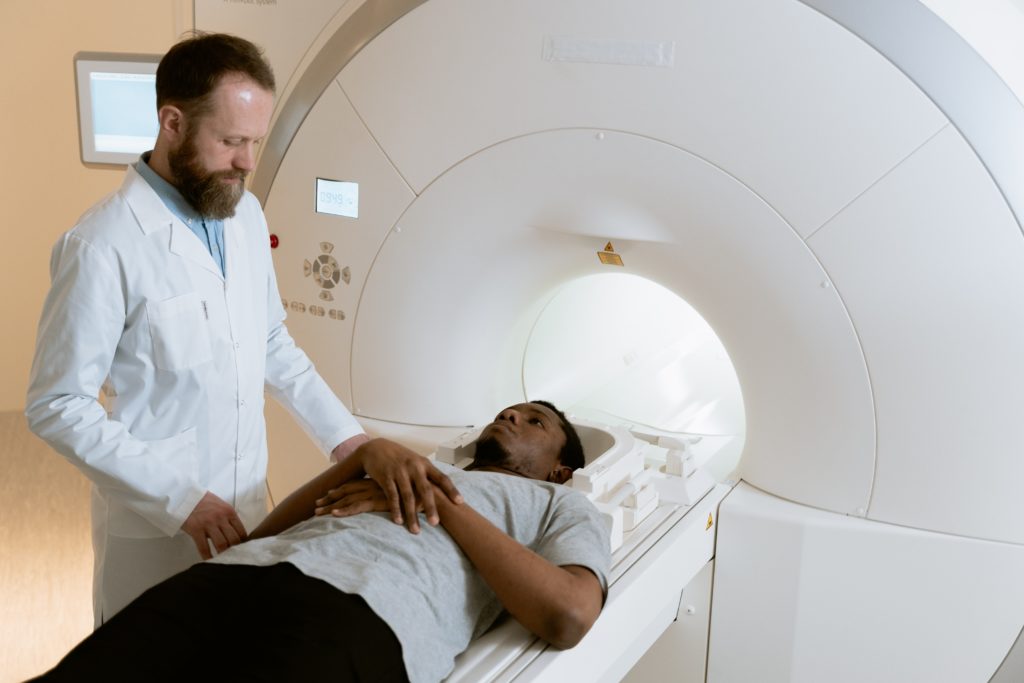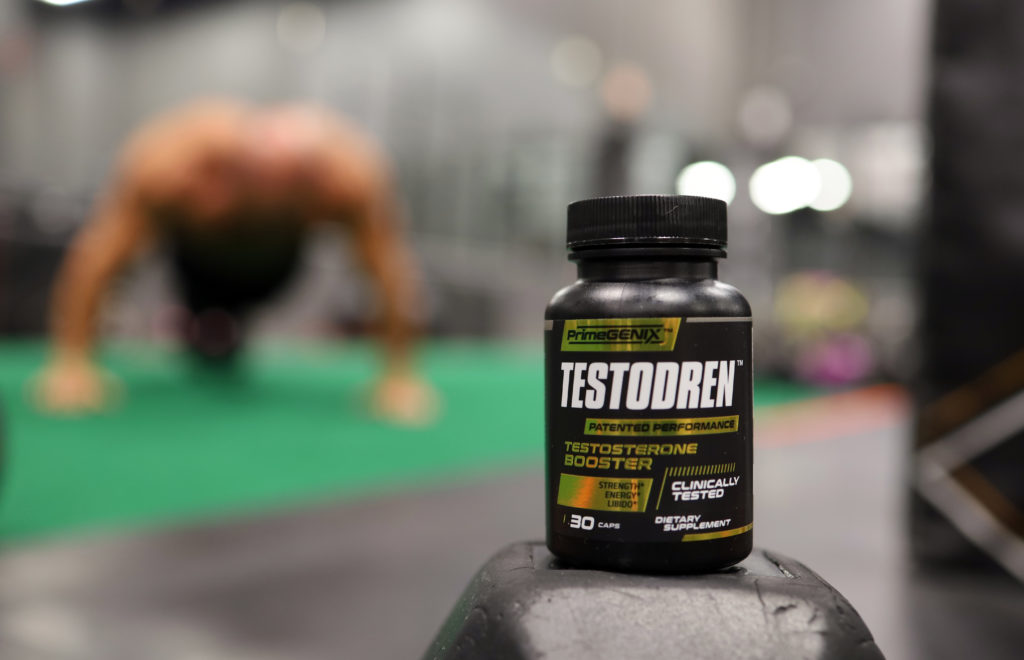Going to the gym and working out gets you in shape but doesn’t always help how the body builds muscle. To increase muscle mass you need to continually challenge your muscles with greater weight and resistance. When muscle fibers are damaged during high-resistance workouts they heal by fusing together which results in greater mass or size. We have known for years that hormones aid in the process of repair and muscle growth. These hormones include testosterone, human growth hormone, and insulin growth factor. What is overlooked is the importance of sleep in muscle growth.
How the Body Builds Muscle
When a person follows a workout regime of progressively greater weight and resistance training, they cause microscopic damage to muscle fibers. The body works to heal this damage. The end result is fused and larger muscle fibers and what we see are larger, sculpted muscles. How the body builds muscle happens on a biochemical level. Hormones like testosterone, human growth hormone, and insulin growth factor improve protein processing in the body. They inhibit protein breakdown and activate stem cells (satellite cells) that are key to muscle development. They stimulate anabolic hormones that promote protein synthesis and muscle growth, and enhance tissue growth.
How Does the Right Resistance and Strength Training Improve Muscle Growth?
There is more than tissue damage and repair to how resistance and strength training promotes muscle growth. The right routine will stimulate release of growth hormone from the person’s pituitary gland and stimulate the release of more testosterone. The right routine will increase the body’s sensitivity to the effects of testosterone. All of this takes time and is how the body builds muscle.
It will take up to a month to see any results of your resistance training. And up to three months to see the results you were looking for. Why is this? The process of muscle breakdown and repair takes time. Never do two high-resistance workout days back to back. Three or four days a week is good and at least two if you want good results.
For the biochemical and rebuilding process to work to your advantage in building muscle there are things you need to do. You need to eat a healthy diet that is rich in protein. Rest the muscles that you focused on in your workout. Finally, you need to get enough sleep to let the body do its work!

Sleep Is Important for Muscle Recovery
Sleep is important for working out, working hard, and busy. When a person doesn’t get enough sleep they do not feel rested, they don’t focus, and muscles do not recover after a workout. Many of us think we are doing fine when we miss our sleep. But the results of your workouts will be measurably different when you get enough sleep versus when you don’t.
Non-REM Sleep and Muscle Recovery
To understand how sleep helps muscle recovery you need to look at the two stages of sleep. The first is the rapid eye movement phase (REM sleep). This kind of sleep comes in cycles of an hour and a half to two hours during the night. It is about a fifth to a fourth of your total sleep. This happens in the hours before you wake up. During the late stage REM sleep the body gives the brain the energy it needs for the day and how the body builds muscle.
The other kind of sleep is deep or slow-wave sleep. This non-REM sleep is when muscle recovery and other restorative functions of the body take place. During this phase a person’s breathing is deep and slow, their blood pressure falls, and the brain rests. This phase takes up about forty percent of a person’s sleep time. While the brain rests it uses less blood. That excess blood supply goes to the body for the “housekeeping” functions. Functions like healing injured tissue which in the case of a body building routine means building muscle mass.
When you spend enough time in non-REM sleep, the pituitary releases growth hormone which, like testosterone and insulin growth factor, stimulate muscle growth. If your body isn’t getting enough growth hormone, you tend to lose muscle mass and not gain any despite your workouts! Getting seven to nine hours of sleep each night and on days after resistance training is critical to success in building muscles. During sleep your body and its testosterone, insulin growth factor, and growth hormone are doing their jobs synthesizing protein to build your muscles.
How Important is Sleep in Muscle Recovery?
You need to do resistance and weight training and eat to build muscle. None of that works though if you don’t let your body do its job at night while you are sleeping. Getting rest is common sense first of all. Your body needs time to restore itself on normal days. Getting enough sleep helps prevent illness, get better from illness, and give you the energy for the next day. When you are sleeping your brain processes information from the previous day and helps form permanent memories. And, this is when athletes build muscle after following their prescribed workout routines.
To optimize your workout results by getting enough sleep consider these things. Make sure that where you sleep is dark, quiet, and cool. You should have a comfortable mattress. And, in this era of handheld devices, don’t spend any time on your screen for at least an hour before going to sleep. The blue light from these devices interferes with your sleep cycle. It does so by messing with the brain’s secretion of melatonin, the hormone that helps you get to sleep and wake up refreshed. And this is how the body builds muscle.

What If Your Body Is Not Producing Enough Testosterone?
To build muscle you need the right workout routine and enough sleep at night. This allows your body’s hormones to do their jobs helping synthesize protein to build and rebuild muscle. But, what if your body is not producing enough testosterone to help the muscle repair process? Starting between ages 30 and 40 men start seeing a drop in testosterone production of about one percent per year. As a rule the effect begins to be noticeable more or less when a guy is in his mid-40’s.
How to Deal with Lower Testosterone Levels
When you want to keep working out, staying in shape, and building muscle into your 40s and beyond, what can you do? Some choose to take testosterone supplements in pill form or as injections. There is evidence that taking too much testosterone can result in unwanted side effects. Side effects like making sleep apnea worse, causing acne and other skin rashes, stimulating non-cancerous growth of the prostate (benign prostatic hypertrophy). It can also lead to enlarging men’s breasts, reducing sperm count and shrinking testicles. Also, it could increase the risk of blood clots and increase the risk of heart disease.
A healthy alternative is to take a natural supplement that stimulates the production of testosterone normally! Testodren made by PrimeGENIX is an excellent choice for increasing testosterone levels by up to 72.87%. This natural compound has been tested in three separate human trials. Every time it worked as desired by increasing testosterone levels and never once did it cause any unwanted side effects! This 100% natural “testosterone booster” is available without a prescription (unlike testosterone injections).
Testodren contains 500 mg of a compound derived from Trigonella foenum-graecum, a natural Fanugreek herb. This product comes with a 67-day money-back guarantee!
Make Sure That Enough Sleep Is Part of Your Muscle Building Routine
Your body has enough testosterone and other hormones needed to synthesize protein and build muscle. When you have enough you can then use a weight and resistance routine to sculpt muscle, stay in shape, and look great. Athletes love to work out, work out with their friends, and this becomes the focus of their efforts. Loving your workouts, burn, and the sweat is not enough to most-effectively build muscle. World-class athletes from weight lifters to marathon runners have learned there is a time to train and a time to rest. This both builds muscle and stamina and in prepares them for competition. Enough sleep needs to be part of your muscle building routine as should be sufficient levels of testosterone.
How Much Sleep Does an Athlete Need?
Doctors recommend seven or more hours of sleep a night for good health. Athletes should aim for seven to nine hours a night and elite athletes with exception training schedules aim for nine hours a night. Hormones like testosterone that build muscles are secreted and do their work during the non-REM part of the sleep cycle. This is the third stage of deep sleep. Elite athletes who work out the most and need the most time to let muscles recover and rebuild need about 9 hours a night. This gives the hormones sufficient time to secrete and do their jobs for muscles to relax and reduce tension and pain. A big part of your muscles being stiff and sore the morning after a big workout? A lack of sleep is to blame for not allowing your body do its repair work.
Benefits of Getting Enough Sleep
We recommend that you get enough sleep so that your resistance and weight training pays off with increased muscle mass and a great look. But, there are a lot more benefits of getting enough sleep. If you sleep less you will end up eating more. When you sleep less you produce less testosterone which is essential to building muscle. You also produce less of the hormone that makes you feel full after eating enough. When this is the case you will tend to eat more than you need to and gain weight. The extreme of this situation is the “Pickwickian Syndrome”. This occurs with severe sleep apnea where people never sleep well and end up being massively obese.
When you never get enough sleep you will be less sensitive to insulin. The end result of this is that your body will not replenish glycogen levels. Glycogen is the main fuel source for muscles. Meaning your workouts will not result in the increased muscle mass that your efforts deserve.
Athletic Performance Improves with Enough Sleep
Building muscle mass and being strong is a nice result of strength and resistance training. However, many of us who work out to increase our strength also need good muscle coordination to perform in the sports that we play. One of the types of memories that get consolidated when you get enough sleep is muscle memory. A good night’s sleep helps sharpen your athletic skills as well as increase your strength.
Specific examples include university tennis players. They increased sleep duration to 9 hours a night and saw their accuracy in serving go up from 35.7% to 41.8%. Then there’s university swimmers who got ten hours of sleep a night. They improved their times for 15 meter swims, dive times off the block, and turn times. University basketball players got 10 hours of sleep a night. They improved their shooting percentages for free throws by 9% and did their half-court sprints faster. All of these results are a combination of better strength and coordination.

Getting Enough Sleep Prevents Illness
Another thing that your body produces and uses with a good night’s sleep are cytokines. These are molecules that the body uses to help the immune system fight infections. Getting enough sleep helps you keep your cytokine levels up where they should be so that you both prevent and help fight infections. This is why when you have a cold and get a good night’s sleep you feel better!
The downside of not getting enough sleep isn’t just that your body doesn’t make the things you need to prevent and fight infections. Also, that with too little sleep your body produces molecules called pro-inflammatory cytokines that actually reduce the efficiency of your immune system!
When you get a flu shot, your body will only produce half the antibodies it normally would.
The good part of the picture is that athletes who train hard generally find it easier to fall asleep and get enough sleep. Don’t reverse this by playing video games on your cell phone at night. And make sure your mattress and bedroom are conducive to a good night’s sleep.
Athletes who get enough sleep don’t just bulk up better and perform better. They have a lower risk of strokes, heart disease, high blood pressure, kidney disease, anxiety and depression than folks who sleep poorly.
Muscle Growth Through Satellite Cell Activation
You need to make sure your testosterone level is adequate to build more muscle. If it is not, use the natural Testodren supplement to raise your testosterone level naturally to a normal level. Then you need to follow a strength and resistance training routine to cause microscopic breakdown of muscle tissue. Following that by getting enough sleep every night gives your body time to produce and use testosterone to synthesize protein for building muscles. The details of this process have to do with activating satellite cells. These cells are activated when muscle fiber organelles are damaged. Satellite cells are located on the outside of muscle fibers (between the plasma and basement membranes). These cells proliferate in areas of muscle damage. They fuse together and to the muscle fibers. Some remain as satellite cells while the majority convert into muscle cells. Then fuse to the damaged cells to create new muscle myofibrils (strands of protein). This process increases the number and thickness of muscles and is how the body builds muscle.
This process goes on continuously but is enhanced by resistance and weight training. The increase in satellite cells and additional nuclei in damaged muscle results in increased amounts of actin. It increases myosin contractile myofilaments, the basis of muscle fibers.
Having sufficient testosterone on board is critical for this process. Testosterone stimulates the pituitary to produce hormones needed for muscle repair. This process in turn increases uptake by skeletal muscle of the necessary amino acids for protein synthesis. Testosterone increases neurotransmitter levels at the site of damaged fibers. This, in turn, helps activate the growth of muscle tissue. It interacts with DNA nuclear receptors resulting in protein synthesis. There is some evidence that testosterone interacts with and regulates satellite cells themselves.

Testodren for Muscle Growth
As we can see, the fundamentals for building muscle are resistance and weight training. You need sufficient testosterone to manage muscle repair and growth. Finally, enough sleep to allow the repair process to play out and allow muscle hypertrophy. For a natural way to restore normal testosterone levels without unnecessary side effects, use Testodren.


